雅思口语高分句式总结
雅思 口语 必背 精简

1. What do you think are the main causes of road accidents?2. Do you know what to do in case of emergency?3. Does your name have any special meaning?4. Where were you come from?5. What kind of landscape surrounds your hometown?6. Will your life change a lot after you immigrate to ABC?7. What is the difference between Beijing and your hometown?8. What are the main places of interest in your hometown?9. What is the climate like in your hometown?10. What is the character of the people like in the region where you live?11. What are the differences in accent between the people of your hometown and Beijing?12. What is people"s favorite food in your region?13. How do you make dumplings?14. What do you do during the Spring Festival?15. Why is the Spring Festival so important to Chinese people?16. Can you describe one of the main festivals celebrated in your country?17. Tell me something about the Lantern Festival.18. Tell me something about the Qing Ming Festival.19. Tell me something about the customs of your country.20. How long have you lived in Beijing?21. What is the weather like in Beijing?22. How do you compare the climate in Beijing with that in your hometown?23. What place in Beijing do you like best? Why ?24. Which is the worst place you"ve been to China?25. Which is the best place you"ve been to China?26. What places in Beijing should a foreigner visit? Why?27. What are the major social problems in Beijing? How can they be solved?28. What is the biggest problem China faces?29. What places in Beijing should a foreigner visit? Why?30. Could you tell me something about your family?31. Have you any children?32. What is your child"s name? Does his name have a meaning?33. What does your wife/husband do?34. When did you get married?35. Describe your wedding.36. How have weddings changed in recent years?37. Are there any special customs about wedding in your region?38. Describe a traditional wedding ceremony.39. Where did you go for your honeymoon?40. Did you have to ask for permission from your parents before you got married?41. Is it acceptable for couples to live together without marrying?42. Where do you think a newly couple should live? Living with their parents or on their own?43. What responsibilities should a couple take?44. How do Chinese usually celebrate birthdays?45. Are there any traditions concerning the birth of a baby?46. What kind of parent do you intend to be?47. What do you think of One-Child Policy in China?48. Why do people in China traditionally want to have a son?49. What difficulties do Chinese farmers have concerning their old age?50. What do you think needs to be done in order to relieve the farmer"s worries?51. What hope or fears do you have for your children?52. What sort of culture do you hope your child will grow up in?53. Are you going to bring up your child differently from the way you were brought up? How?54. Do you enjoy shopping?55. Who does most of the shopping in your family?56. What are you good at cooking? What is your favorite dish?57. Who does most of cooking in your family?58. Is there *** discrimination in China?59. How do you sum up women"s conditions in China?60. What are the causes of *** discrimination?61. Should government pay certain salaries to those housewives? Why or why not?62. Would you want your wife to continue with her career or to stay at home taking care of the household after you get married?63. Have you ever wished to be one of the opposite ***? Why (why not)?64. What would you do if your next-door neighbour were noisy nearly all the time?65. Do you have a lot of friend?66. What does friendship mean to you? What kind of people do you make friend with?67. What is your major?68. How do you like your major?69. When and where did you graduate? What qualifications have you obtained?70. Do you still remember your school days?71. What impressed you most when you were at university?72. Which is the best university in your country?73. Could you sum up your own study habits in a few points?74. What do you think of the practice of setting up key schools in primary and secondary school education in China?75. Do you think the subjects you are studying today are relevant to present-day society? Why ?76. What do you think education should be? Should it be a process of learning what is useful for your future life or should it be simply learning for enjoyment? Why?77. What do you do for a living?78. What do you do in the office every day?79. Since your job seems too professional to me, could you explain it in detail?80. What are your job prospects?81. If you had the opportunity to change your job, what would you do with it?82. Do you have any ambitious?83. Will any possible future changes affect your job in any way?84. What are your spare time interests?85. How do you spend your weekends?86. What is your favorite sport? What are the rules?87. What is the most popular sport in your country?88. What are the sporting facilities like in your university/Beijing?89. What do you know about Qigong? Do you believe in Qigong?90. What do you do in your spare time?91. Do you often read newspapers? If not, why ones do you read?92. What do you think of computer?93. Do you think computer has changed our life so much?94. Do you often go to the cinema/theatre?95. What kind of films do you like best?96. Do you often watch TV? What is your favorite program?97. Do you think watching TV too much is a waste of time?98. What kind of music do you enjoy?99. Who is your favorite film star? Will you describe him/her to me?100. Do you enjoy travelling?101. Where have you been travelling to? Which place interested you most? 102. Do you smoking?103. Do you think smoking is a problem that needs special attention and has to be solved? If so, why?104. What do you know about ABC?105. What problem do you think you will have in ABC?106. How will you overcome the difficulties?107. Do you think you will be able to cope with English-demands of your intended study program in ABC?108. What difficulties do you think you’ll encounter in your studies in ABC? 109. Can you imagine what life in Britain/Canada/Australia/London, etc. would be like?110. How will you fare in Britain/Canada/Australia, etc. without your family? 111. What do you intend to study?112. Which university are you going to study at?113. Why did you choose this university?114. Where are you going to study in ABC?115. What are you plans in ABC?116. What is your research proposal all about?117. What do you hope for most from your study abroad?118. Will your study abroad help your job prospects after come back to China? 119. Should you study more theory or do more practice? Give your reasons, please. 120. What kind of differences in the cultures are you expecting between China and the ABC?121. How will your study in Britain benefit your work in China when you come back to China?122. How will your study in Britain benefit your work in China when you come back to China?123. What do you intend to do after you finish studying?124. What will be your main problem when you are study in a foreign country? 125. What problem can you foresee in the future when you come back to China? 126. Will there be any adjustment problems in your life when you come back to China? If so, what are they?127. Will you have to make any changes in your work/life when you come back to China?128. Do you think there will be a gap between your knowledge gained in China and the level of knowledge you are going to encounter on arrival? If so, what will it be? 129. What do you think of the future of China keeps an open policy?130. What do you regard as the most significant events in your country’s recent history?131. Are there any special places you want to see in Canada? What are they? 132. What do you especially want to do in Canada?133. How do you like your life in ABC University?134. What do you think of the training in the university?135. In what way do you think university training is helpful or falls short?136. What aspect of English do you find the most difficult?137. Do you find American English easier to understand than Britain English? 138. What sports are played in your country?139. Could you describe the traditional architecture of your country?140. What role dose religion play in everyday life in your country?141. What would you regard as the most significant events in your country"s recent history?142. How aware do you think people are nowadays about environmental issues? 143. Could you tell me why you chose to study at the university of ABC?144. What role dose tourism play in your country"s economy?145. How serious is unemployment in your country?146. In your opinion, what are the most serious problems associated with modern life?147. What do you think have been the most important changes in your field over the past 5 years?148. What are you going to major in ?149. Are you going to do your own cooking when you are at university?150. Some local students feel that overseas students get preferential treatment. What is your opinion?151. Do you think you will be able to cope with the English-language demands of your intended program?。
雅思口语之常用句型总结
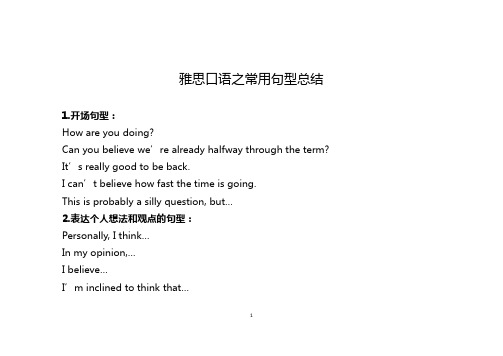
雅思口语之常用句型总结1.开场句型:How are you doing?Can you believe we’re already halfway through the term? It’s really good to be back.I can’t believe how fast the time is going.This is probably a silly question, but…2.表达个人想法和观点的句型:Personally, I think…In my opinion,…I believe…I’m inclined to think that…1Personally, I would recommend…3表达喜欢和不喜欢、喜好和偏好的句型:I really enjoy…I’m passionate about…I can’t stand…I’m not particularly fond of…I’m not particularly fond of doing…4.表达原因和理由的句型:The reason why I like/dislike…is because…One of the reasons why I enjoy…is that…One of the reasons why I find it difficult to do…is because…One of the reasons why I prefer…to…is because…5.表达经历和感受的句型:I remember when I first…It was a great experience.2The last time I…was a disaster.When I was younger, I always used to…It was a lot of fun.One of the best things about…is that you can…It makes me feel really good.6.表达建议和意见的句型:In my opinion, you should…Personally, I would recommend…If I were you, I would…I think it would be a good idea to…Personally, I would avoid doing…because…3。
雅思口语万能句式
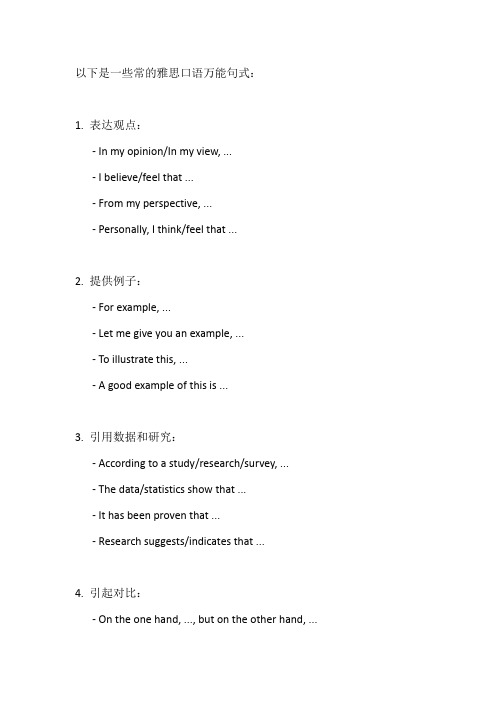
以下是一些常的雅思口语万能句式:1. 表达观点:- In my opinion/In my view, ...- I believe/feel that ...- From my perspective, ...- Personally, I think/feel that ...2. 提供例子:- For example, ...- Let me give you an example, ...- To illustrate this, ...- A good example of this is ...3. 引用数据和研究:- According to a study/research/survey, ...- The data/statistics show that ...- It has been proven that ...- Research suggests/indicates that ...4. 引起对比:- On the one hand, ..., but on the other hand, ...- While ..., on the contrary, ...- Despite ..., ..., on the contrary, ...- However, ...5. 表达原因和结果:- The reason behind this is ...- As a result/consequence, ...- That is why ...- This leads to ...6. 表达喜好和偏好:- I'm really into/keen on ...- I have a preference for ...- I'm a big fan of ...- I enjoy/like ...7. 表达同意和不同意:- I totally agree/disagree with ...- I agree to some extent, but ...- I see your point, but I think ...- I can understand where you're coming from, but ...8. 提出建议:- I would suggest/recommend that ...- It might be a good idea to ...- Have you considered ...- How about ...9. 表达看法改变:- My opinion has changed over time because ...- I used to think/feel that ..., but now I realize/understand that ...- I have come to the conclusion that ...10. 给出总结:- In conclusion/To sum up, ...- All in all, ...- Taking everything into consideration, ...- To conclude, ...记住,使用这些句式时要注意语境和适用性,灵活运用以表达自己的观点和思考。
雅思口语好句
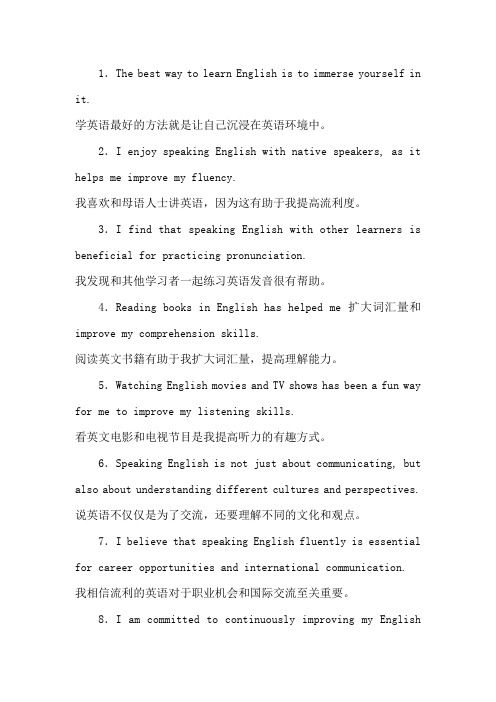
1.The best way to learn English is to immerse yourself in it.学英语最好的方法就是让自己沉浸在英语环境中。
2.I enjoy speaking English with native speakers, as it helps me improve my fluency.我喜欢和母语人士讲英语,因为这有助于我提高流利度。
3.I find that speaking English with other learners is beneficial for practicing pronunciation.我发现和其他学习者一起练习英语发音很有帮助。
4.Reading books in English has helped me扩大词汇量和improve my comprehension skills.阅读英文书籍有助于我扩大词汇量,提高理解能力。
5.Watching English movies and TV shows has been a fun way for me to improve my listening skills.看英文电影和电视节目是我提高听力的有趣方式。
6.Speaking English is not just about communicating, but also about understanding different cultures and perspectives. 说英语不仅仅是为了交流,还要理解不同的文化和观点。
7.I believe that speaking English fluently is essential for career opportunities and international communication.我相信流利的英语对于职业机会和国际交流至关重要。
8.I am committed to continuously improving my Englishlanguage skills for personal and professional development. 我致力于不断提升自己的英语水平,以促进个人和职业发展。
雅思口语part2万能套话
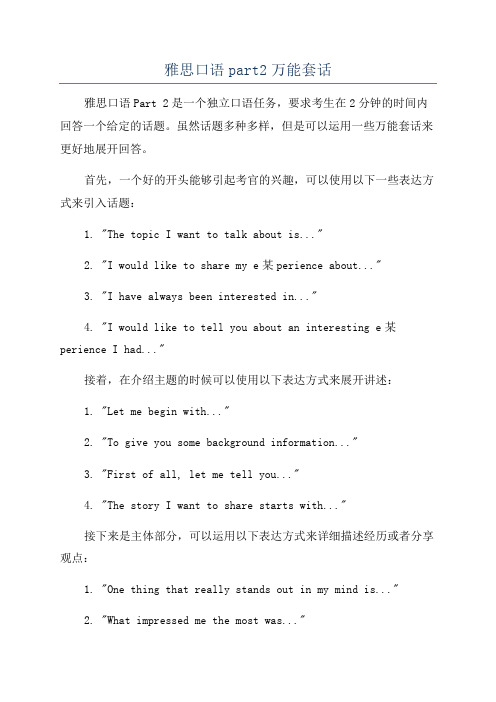
雅思口语part2万能套话雅思口语Part 2是一个独立口语任务,要求考生在2分钟的时间内回答一个给定的话题。
虽然话题多种多样,但是可以运用一些万能套话来更好地展开回答。
首先,一个好的开头能够引起考官的兴趣,可以使用以下一些表达方式来引入话题:1. "The topic I want to talk about is..."2. "I would like to share my e某perience about..."3. "I have always been interested in..."4. "I would like to tell you about an interesting e某perience I had..."接着,在介绍主题的时候可以使用以下表达方式来展开讲述:1. "Let me begin with..."2. "To give you some background information..."3. "First of all, let me tell you..."4. "The story I want to share starts with..."接下来是主体部分,可以运用以下表达方式来详细描述经历或者分享观点:1. "One thing that really stands out in my mind is..."2. "What impressed me the most was..."3. "To my surprise..."4. "What I found interesting was..."5. "From my point of view..."同时,可以使用以下一些句子连接词来过渡不同的段落或观点:1. "Furthermore..."2. "In addition..."3. "Moreover..."4. "Besides that..."5. "On top of that..."在结束时可以使用以下表达方式来总结观点或经历:1. "In conclusion..."2. "To sum up..."3. "To wrap up..."4. "All in all..."5. "In a nutshell..."最后,可以用以下一些表达方式来关闭话题或引入下一个话题:1. "That's all I have to say about..."2. "That brings me to the end of my story/e某perience..."3. "Now, let's move on to the ne某t topic..."4. "I hope you found my story/e某perience interesting..."综上所述,以上是一些可以在雅思口语Part 2中使用的万能套话。
雅思口语高分模板汇总
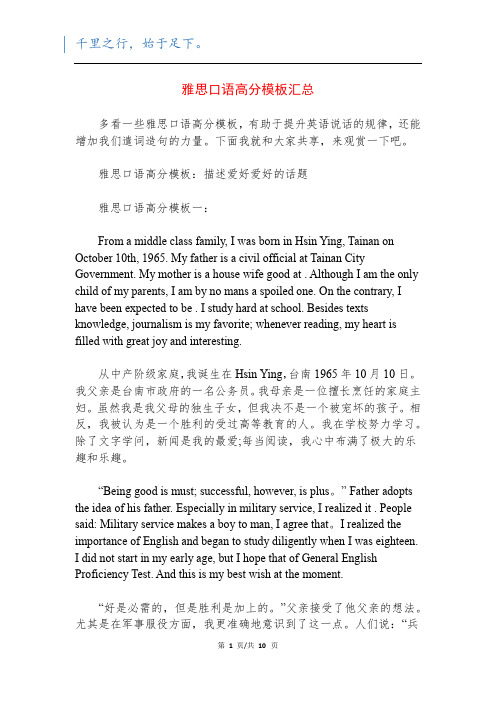
雅思口语高分模板汇总多看一些雅思口语高分模板,有助于提升英语说话的规律,还能增加我们遣词造句的力量。
下面我就和大家共享,来观赏一下吧。
雅思口语高分模板:描述爱好爱好的话题雅思口语高分模板一:From a middle class family, I was born in Hsin Ying, Tainan on October 10th, 1965. My father is a civil official at Tainan City Government. My mother is a house wife good at . Although I am the only child of my parents, I am by no mans a spoiled one. On the contrary, I have been expected to be . I study hard at school. Besides texts knowledge, journalism is my favorite; whenever reading, my heart is filled with great joy and interesting.从中产阶级家庭,我诞生在Hsin Ying,台南1965年10月10日。
我父亲是台南市政府的一名公务员。
我母亲是一位擅长烹饪的家庭主妇。
虽然我是我父母的独生子女,但我决不是一个被宠坏的孩子。
相反,我被认为是一个胜利的受过高等教育的人。
我在学校努力学习。
除了文字学问,新闻是我的最爱;每当阅读,我心中布满了极大的乐趣和乐趣。
“Being good is must; successful, however, is plus。
” Father adopts the idea of his father. Especially in military service, I realized it . People said: Military service makes a boy to man, I agree that。
雅思口语高分模板分享
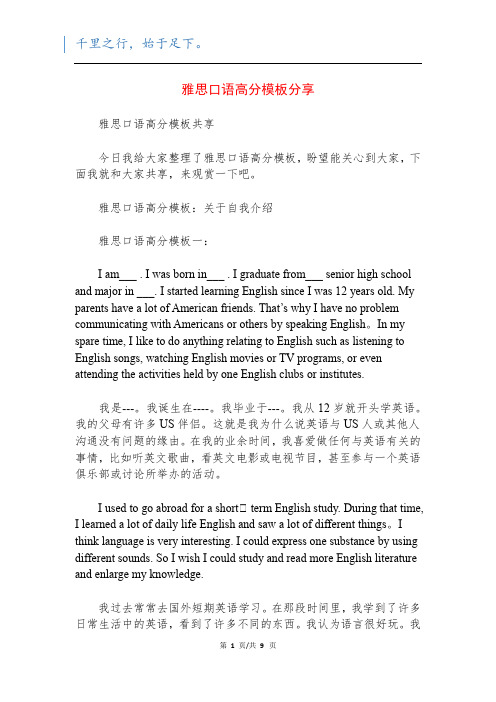
雅思口语高分模板分享雅思口语高分模板共享今日我给大家整理了雅思口语高分模板,盼望能关心到大家,下面我就和大家共享,来观赏一下吧。
雅思口语高分模板:关于自我介绍雅思口语高分模板一:I am___ . I was born in___ . I graduate from___ senior high school and major in ___. I started learning English since I was 12 years old. My parents have a lot of American friends. That’s why I have no problem communicating with Americans or others by speaking English。
In my spare time, I like to do anything relating to English such as listening to English songs, watching English movies or TV programs, or even attending the activities held by one English clubs or institutes.我是---。
我诞生在----。
我毕业于---。
我从12岁就开头学英语。
我的父母有许多US伴侣。
这就是我为什么说英语与US人或其他人沟通没有问题的缘由。
在我的业余时间,我喜爱做任何与英语有关的事情,比如听英文歌曲,看英文电影或电视节目,甚至参与一个英语俱乐部或讨论所举办的活动。
I used to go abroad for a short‐ term English study. During that time, I learned a lot of daily life English and saw a lot of different things。
雅思口语常用的经典句型
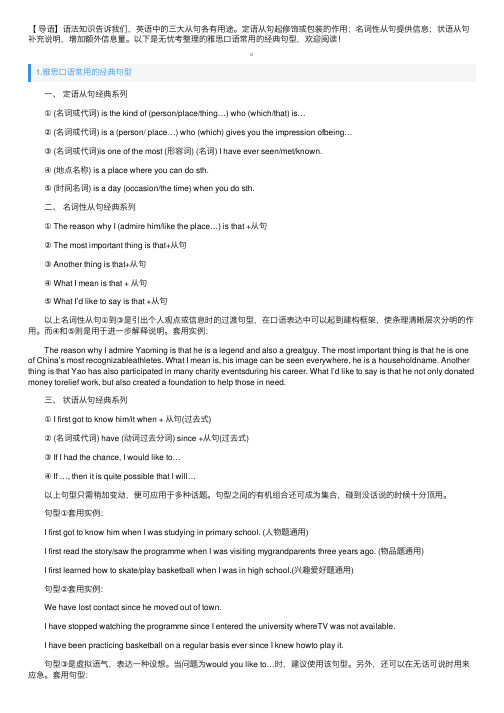
【导语】语法知识告诉我们,英语中的三⼤从句各有⽤途。
定语从句起修饰或包装的作⽤;名词性从句提供信息;状语从句补充说明,增加额外信息量。
以下是⽆忧考整理的雅思⼝语常⽤的经典句型,欢迎阅读!1.雅思⼝语常⽤的经典句型 ⼀、定语从句经典系列 ① (名词或代词) is the kind of (person/place/thing…) who (which/that) is… ② (名词或代词) is a (person/ place…) who (which) gives you the impression ofbeing… ③ (名词或代词)is one of the most (形容词) (名词) I have ever seen/met/known. ④ (地点名称) is a place where you can do sth. ⑤ (时间名词) is a day (occasion/the time) when you do sth. ⼆、名词性从句经典系列 ① The reason why I (admire him/like the place…) is that +从句 ② The most important thing is that+从句 ③ Another thing is that+从句 ④ What I mean is that + 从句 ⑤ What I’d like to say is that +从句 以上名词性从句①到③是引出个⼈观点或信息时的过渡句型,在⼝语表达中可以起到建构框架,使条理清晰层次分明的作⽤。
⽽④和⑤则是⽤于进⼀步解释说明。
套⽤实例: The reason why I admire Yaoming is that he is a legend and also a greatguy. The most important thing is that he is one of China’s most recognizableathletes. What I mean is, his image can be seen everywhere, he is a householdname. Another thing is that Yao has also participated in many charity eventsduring his career. What I’d like to say is that he not only donated money torelief work, but also created a foundation to help those in need. 三、状语从句经典系列 ① I first got to know him/it when + 从句(过去式) ② (名词或代词) have (动词过去分词) since +从句(过去式) ③ If I had the chance, I would like to… ④ If …, then it is quite possible that I will… 以上句型只需稍加变动,便可应⽤于多种话题。
雅思口语高分万能句

雅思口语高分万能句1.与考官打招呼Glad to meet you here.How nice to see you.Fancy seeing you.How are you?I'm glad to have had the opportunity to meet you here. I'm glad to meet you.I'm pleased to meet you.It's a pleasure to meet you.2.没听懂问题Could you please rephrase that question/topic?I'm not exactly sure what you mean…1Do you mean…?If I understand right…I'm sorry if I'm being a little slow, but…?I'm sorry, I'm not sure I understand. Do you mean (that )…?So am I right in saying …?If I've got the picture, then …So what you mean is …, right?Sorry, I don't quite catch you. You mean …?Can I get one thing clear?Would I be correct in supposing …?I'm not exactly sure how to answer that question, but (perhaps)…That's a rather difficult question, but (maybe) …I'm sorry, but I don't know much about3.发表意见2That's difficult to answer, but maybe …I'm sorry, but I don’t know much about …,but perhaps…Maybe I can answer your question by telling you about a personal experience I had. That's an interesting question …let me see. Well, I suppose that …Yes, that's a big issue.4.连接词Well,…Actually …In fact …You see …You know, …How shall I put it…Let me think for a second …Give me a few seconds…35.换一种说法In other words, I am …And that means …Let me put it another way, …What I'm suggesting is …All I'm trying to say is …What I'm getting at is …If I can rephrase that …Perhaps I should make that clearer by sayingPerhaps it would be more accurate to say …The point I'm making is that ..6.回答完毕、结束语I'm afraid that's about as much as I know.I think that's all. 、I can’t think of anything else right now.4That's very kind of you. Thank you.Thank you very much for giving me information.Well, thanks for talking to me and I wish you all the best.Thank you, sir?Nice talking to you.I appreciate your talking with me. Goodbye.I enjoyed talking to you.It's been very helpful talking to you.将考试当作一场稍正式的coffee chat,运用自己熟悉的词汇和句式,认真表达。
雅思口语万能句开头句
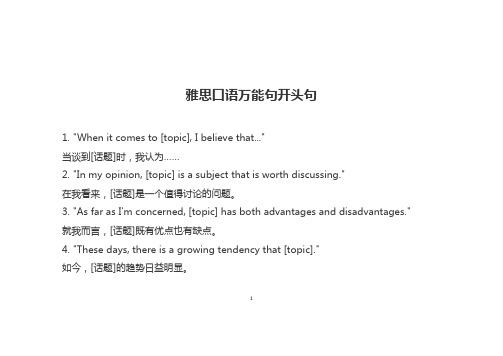
雅思口语万能句开头句1. "When it comes to [topic], I believe that..."当谈到[话题]时,我认为……2. "In my opinion, [topic] is a subject that is worth discussing."在我看来,[话题]是一个值得讨论的问题。
3. "As far as I'm concerned, [topic] has both advantages and disadvantages." 就我而言,[话题]既有优点也有缺点。
4. "These days, there is a growing tendency that [topic]."如今,[话题]的趋势日益明显。
15. "It is commonly believed that [topic], but I have my own看法."人们普遍认为[话题],但我有自己的看法。
6. "In recent years, the issue of [topic] has aroused public concern."近年来,[话题]的问题引起了公众关注。
7. "Nowadays, more and more people are paying attention to [topic]."如今,越来越多的人开始关注[话题]。
8. "When it comes to [topic], different people have different看法."当谈到[话题]时,不同的人有不同的看法。
9. "In my view, [topic] is a complex issue that cannot be simply categorized as good or bad."在我看来,[话题]是一个复杂的问题,不能简单地归类为好或坏。
31种雅思口语高分必背公式
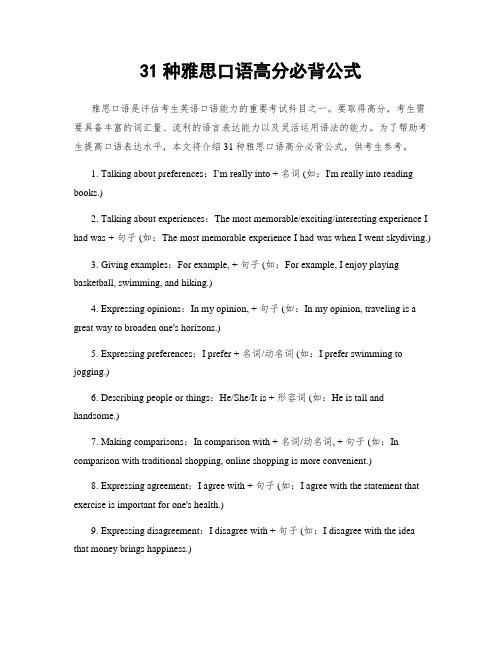
31种雅思口语高分必背公式雅思口语是评估考生英语口语能力的重要考试科目之一。
要取得高分,考生需要具备丰富的词汇量、流利的语言表达能力以及灵活运用语法的能力。
为了帮助考生提高口语表达水平,本文将介绍31种雅思口语高分必背公式,供考生参考。
1. Talking about preferences:I’m really into + 名词 (如:I'm really into reading books.)2. Talking about experiences:The most memorable/exciting/interesting experience I had was + 句子 (如:The most memorable experience I had was when I went skydiving.)3. Giving examples:For example, + 句子 (如:For example, I enjoy playing basketball, swimming, and hiking.)4. Expressing opinions:In my opinion, + 句子 (如:In my opinion, traveling is a great way to broaden one's horizons.)5. Expressing preferences:I prefer + 名词/动名词 (如:I prefer swimming to jogging.)6. Describing people or things:He/She/It is + 形容词 (如:He is tall and handsome.)7. Making comparisons:In comparison with + 名词/动名词, + 句子 (如:In comparison with traditional shopping, online shopping is more convenient.)8. Expressing agreement:I agree with + 句子 (如:I agree with the statement that exercise is important for one's health.)9. Expressing disagreement:I disagree with + 句子 (如:I disagree with the idea that money brings happiness.)10. Describing changes:There has been a significant + 形容词/noun (如:There has been a significant increase in the number of people using smartphones.)11. Giving reasons:The reason why + 句子 is that + 原因 (如:The reason why I chose to study abroad is that I want to experience different cultures.)12. Describing trends:There has been a steady/increasing/decreasing + 名词 (如:There has been a steady rise in global temperatures.)13. Talking about advantages:One of the advantages of + 名词/动名词 is that + 句子 (如:One of the advantages of living in a big city is that there are more job opportunities.)14. Talking about disadvantages:One of the disadvantages of + 名词/动名词 is that + 句子 (如:One of the disadvantages of living in a big city is the high cost of living.)15. Expressing likelihood:It is likely/probable that + 句子 (如:It is likely that he will pass the exam.)16. Expressing certainty:I am certain/sure/confident that + 句子 (如:I am confident that I will achieve my goals.)17. Giving suggestions:I would suggest/recommend + 动名词/动词原形 (如:I would suggest taking a break and relaxing.)18. Expressing regrets:I regret + 动名词/动词-ing (如:I regret not studying harder for the exam.)19. Giving instructions:First, + 句子. Then, + 句子 (如:First, wash the vegetables. Then, cut them into small pieces.)20. Expressing importance:It is important/crucial/vital to + 动词原形 (如:It is important to maintain a healthy lifestyle.)21. Expressing consequences:If + 句子, + 结果 (如:If you don't study, you will fail the exam.)22. Expressing purpose:The purpose of + 名词/动名词 is to + 动词原形 (如:The purpose of education is to equip students with knowledge and skills.)23. Expressing condition:If + 句子, + 句子 (如:If it rains, we will stay indoors.)24. Expressing possibilities:There is a possibility/chance that + 句子 (如:There isa possibility that he will be promoted.)25. Expressing alternatives:Instead of + 动名词/动词-ing, + 句子 (如:Instead of driving, I prefer cycling to work.)26. Expressing reasons:The reason for + 名词/动名词 is that + 句子 (如:The reason for the traffic jam is that there is construction on the road.)27. Expressing consequences:As a result of + 名词/动名词, + 句子 (如:As a result of the pandemic, many people lost their jobs.)28. Expressing possibilities:It is possible/probable that + 句子 (如:It is possible that she will arrive late.)29. Giving examples:Take + 名词/动名词 for example (如:Take environmental pollution for example.)30. Expressing time:In + 一段时间, + 句子 (如:In recent years, people have become more aware of the importance of environmental protection.)31. Expressing contrast:On the one hand, + 句子. On the other hand, + 句子 (如:On the one hand, technology has made our lives more convenient. On the other hand, it has also led to reliance and decreased interpersonal connections.)通过学习和熟练运用这些雅思口语高分必背公式,考生将能够在口语表达中更加流利地使用适当的词汇和句子结构,从而获得更高的口语分数。
雅思口语句型结构大全
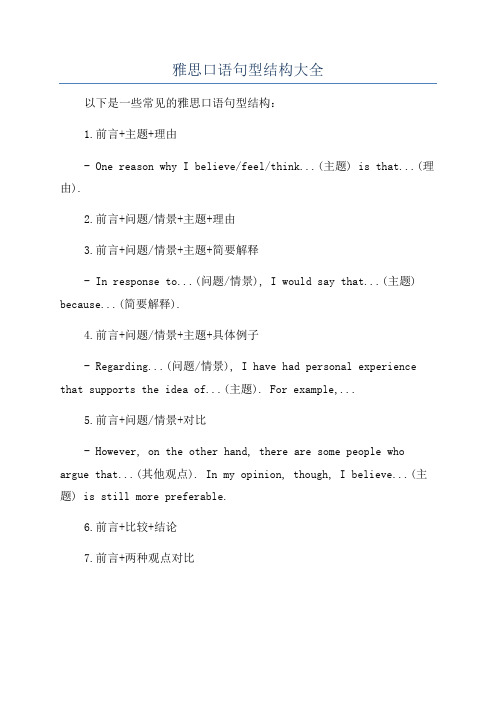
雅思口语句型结构大全以下是一些常见的雅思口语句型结构:1.前言+主题+理由- One reason why I believe/feel/think...(主题) is that...(理由).2.前言+问题/情景+主题+理由3.前言+问题/情景+主题+简要解释- In response to...(问题/情景), I would say that...(主题) because...(简要解释).4.前言+问题/情景+主题+具体例子- Regarding...(问题/情景), I have had personal experience that supports the idea of...(主题). For example,...5.前言+问题/情景+对比- However, on the other hand, there are some people who argue that...(其他观点). In my opinion, though, I believe...(主题) is still more preferable.6.前言+比较+结论7.前言+两种观点对比- On one hand, some people argue that...(观点 A). On theother hand, others believe that...(观点 B). Personally, I agree with/oppose to...(主题).8.前言+父母观点+个人观点- My parents have always believed that...(父母观点). However,I tend to have a different opinion on...(主题).9.前言+现象描述+个人看法- It is often said/observed that...(现象描述). From my perspective, I think/feel...(个人看法).10.前言+选择题+理由- If I am asked to choose between...(选项 A) and...(选项 B), I would definitely choose...(选项 A) because...(理由).这些句型结构可以根据具体的题目和话题进行适当的调整和变化。
雅思口语考试万能句子
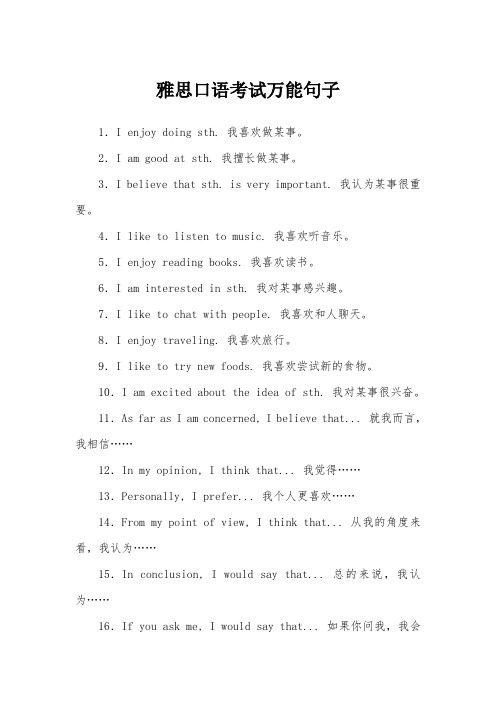
雅思口语考试万能句子1.I enjoy doing sth. 我喜欢做某事。
2.I am good at sth. 我擅长做某事。
3.I believe that sth. is very important. 我认为某事很重要。
4.I like to listen to music. 我喜欢听音乐。
5.I enjoy reading books. 我喜欢读书。
6.I am interested in sth. 我对某事感兴趣。
7.I like to chat with people. 我喜欢和人聊天。
8.I enjoy traveling. 我喜欢旅行。
9.I like to try new foods. 我喜欢尝试新的食物。
10.I am excited about the idea of sth. 我对某事很兴奋。
11.As far as I am concerned, I believe that... 就我而言,我相信……12.In my opinion, I think that... 我觉得……13.Personally, I prefer... 我个人更喜欢……14.From my point of view, I think that... 从我的角度来看,我认为……15.In conclusion, I would say that... 总的来说,我认为……16.If you ask me, I would say that... 如果你问我,我会说……17.To be honest, I would prefer to... 说实话,我更倾向于……18.To tell you the truth, I don't really know... 说真的,我真的不知道……19.To be honest with you, I don't think that... 坦白说,我认为……20.In general, I would say that... 总的来说,我认为……。
雅思口语:精华材料汇总
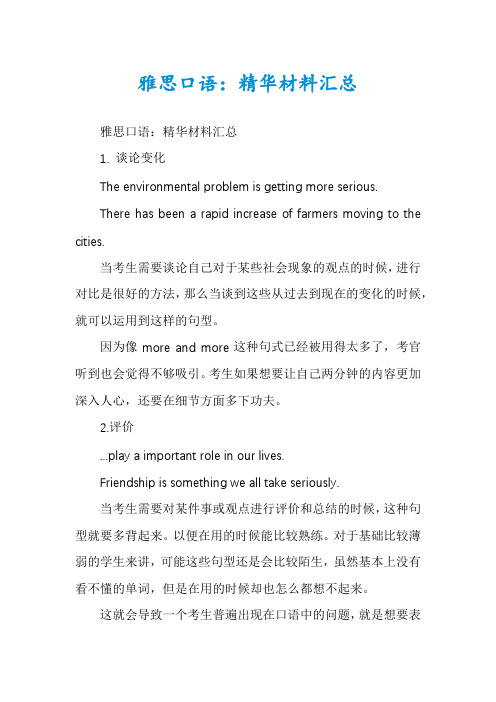
雅思口语:精华材料汇总雅思口语:精华材料汇总1. 谈论变化The environmental problem is getting more serious.There has been a rapid increase of farmers moving to the cities.当考生需要谈论自己对于某些社会现象的观点的时候,进行对比是很好的方法,那么当谈到这些从过去到现在的变化的时候,就可以运用到这样的句型。
因为像more and more这种句式已经被用得太多了,考官听到也会觉得不够吸引。
考生如果想要让自己两分钟的内容更加深入人心,还要在细节方面多下功夫。
2.评价...play a important role in our lives.Friendship is something we all take seriously.当考生需要对某件事或观点进行评价和总结的时候,这种句型就要多背起来。
以便在用的时候能比较熟练。
对于基础比较薄弱的学生来讲,可能这些句型还是会比较陌生,虽然基本上没有看不懂的单词,但是在用的时候却也怎么都想不起来。
这就会导致一个考生普遍出现在口语中的问题,就是想要表达一件事的时候不知道怎么去说,因为急于想要去证明自己,但是句型的匮乏让自己的语言变得很无力。
所以归根结底还是要背,这些句型其实很容易,只要考试肯下功夫,花时间去记去练,就一定能熟练掌握。
3. 总结规律By and large,Chinese people are very respectful of the elderly.On the whole,Chinese students receive a good education in the basics.By and large和On the whole都是很好的过渡词。
在对一件事情阐述自己的观点时,考生要做的是沉着冷静的思考,而这些比较高级的过渡词既能体现考生有一定的水平,也能帮助考生更好地组织自己的思路和语言,在原本的基础上达到更好的效果。
雅思口语之对话句式

雅思口语之对话句式
1.对话开始
Hello, how are you? 你好吗?
Nice to meet you. 很高兴见到你。
2.介绍自己
My name is XX. 我叫XX。
I'm a student at XX University. 我XX大学的学生。
3.询问信息
What's your major? 你是什么专业的?
How long have you been studying English? 你学英语多久了?
4.表达观点
I think that XX is very important. 我认为XX非常重要。
1
In my opinion, XX is a better choice. 在我看来,XX是一个更好的选择。
5.提出建议
You should try to speak more English every day. 你应该试着每天多说英语。
It's a good idea to study in a group. 在小组里学习是个好主意。
6.表达感谢
Thank you very much for your help.非常感谢你的帮助。
I appreciate your time and effort. 我感激你的时间和努力。
7.结束对话
It was nice talking to you. 很高兴和你交谈。
Hope to see you again in the future. 希望未来能再次见到你。
2。
雅思口语之高能句式汇总
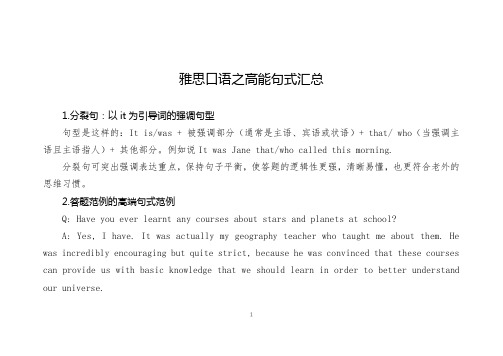
雅思口语之高能句式汇总1.分裂句:以it为引导词的强调句型句型是这样的:It is/was + 被强调部分(通常是主语、宾语或状语)+ that/ who(当强调主语且主语指人)+ 其他部分。
例如说It was Jane that/who called this morning.分裂句可突出强调表达重点,保持句子平衡,使答题的逻辑性更强,清晰易懂,也更符合老外的思维习惯。
2.答题范例的高端句式范例Q: Have you ever learnt any courses about stars and planets at school?A: Yes, I have. It was actually my geography teacher who taught me about them. He was incredibly encouraging but quite strict, because he was convinced that these courses can provide us with basic knowledge that we should learn in order to better understand our universe.1在回答这道题时使用分裂句强调了是我的地理老师教我这些课程的。
然后顺理成章地进一步描述了为什么他认为要学习这些课程。
如果回答”Yes, I have. My geography teacher taught me about them.”那显然这道题的回答是不够充分的。
Q: Who bought your clothes for you when you were a child?A: When I was a kid, it was my parents who chose the clothes for me. When they noticed that I was short of clothes, they would take me to the stores in downtown areas, and picked out the clothes that would suit me most.这里使用分裂句避免了答题时再简单重复问题,不让考官觉得我们在凑回答字数,同时,也为下面我们要回答的内容定了拓展方向,方便我们进一步进行补充说明。
31种雅思口语高分公式要点提炼
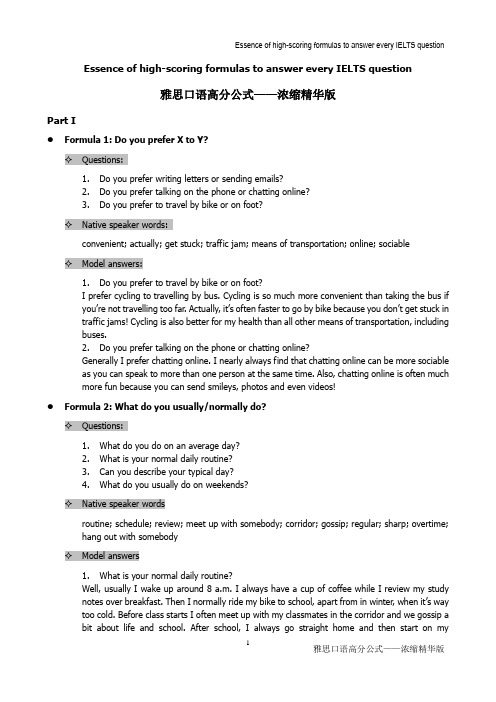
Essence of high-scoring formulas to answer every IELTS question雅思口语高分公式——浓缩精华版Part I●Formula 1: Do you prefer X to Y?✧Questions:1.Do you prefer writing letters or sending emails?2.Do you prefer talking on the phone or chatting online?3.Do you prefer to travel by bike or on foot?✧Native speaker words:convenient; actually; get stuck; traffic jam; means of transportation; online; sociable✧Model answers:1.Do you prefer to travel by bike or on foot?I prefer cycling to travelling by bus. Cycling is so much more convenient than taking the bus ifyou’re not travelling too far. Actually, it’s often faster to go by bike because you don’t get stuck in traffic jams! Cycling is also better for my health than all other means of transportation, including buses.2.Do you prefer talking on the phone or chatting online?Generally I prefer chatting online. I nearly always find that chatting online can be more sociable as you can speak to more than one person at the same time. Also, chatting online is often much more fun because you can send smileys, photos and even videos!●Formula 2: What do you usually/normally do?✧Questions:1.What do you do on an average day?2.What is your normal daily routine?3.Can you describe your typical day?4.What do you usually do on weekends?✧Native speaker wordsroutine; schedule; review; meet up with somebody; corridor; gossip; regular; sharp; overtime;hang out with somebody✧Model answers1.What is your normal daily routine?Well, usually I wake up around 8 a.m. I always have a cup of coffee while I review my study notes over breakfast. Then I normally ride my bike to school, apart from in winter, when it’s way too cold. Before class starts I often meet up with my classmates in the corridor and we gossip a bit about life and school. After school, I always go straight home and then start on myhomework while my mum cooks me dinner. I usually go to bed at about 10 p.m.2.Do you do the same thing at the same time every day?During the week, I have a very regular schedule because of my job. I always wake up just after7 in the morning, then eat my breakfast on the way to the subway station. I get to work at 8o’clock sharp, and usually work until 5, sometimes I work overtime until 7 or 8. After I get homeI normally eat dinner with my wife and after that either hang out with friends or watch TV beforegoing to bed at about 11.●Formula 3: What do you like to do (in your spare time)?✧Questions:1.What do you like to do in your spare time?2.What do you like to do when you are on holidays?3.What do you like to do when you are not working?✧Native speaker words:be quite into something; movie/film; hip-hop; gig; be keen on something; novel; short story;every so often; stimulating✧Model answers1.What do you like to do in your spare time?Well, I have lots of hobbies I like to do in my spare time. I’m very interested in studying English and I’m also quite into movies---sometimes I combine these two interests by watching British or American films. What I particularly enjoy doing, though, is playing football---it’s so exciting!2.What do you like to do in the evening?I work really hard during the day so in the evening I like to relax and unwind. I’m a big fan ofhip-hop and rock music, and I like hanging out with friends and watching gigs. I’m also keen on reading novels and short stories. I’m involved in a reading group at my university and every so often we get together and discuss the latest books we’ve read over dinner---it’s so stimulating to talk and hear different views about the books we’ve all read.●Formula 4: What do you dislike about X?✧Questions:1.What do you dislike about parties?2.What don’t you like about your job?3.What do you dislike about eating in the restaurant?✧Native speaker words:find oneself doing something; superficial; field; line manager; commute; rush hour; jam-packed✧Model answers1.What do you dislike about parties?Well, I generally enjoy the parties I go to, but there are a few things I don’t like. I don’t like all the drinking that usually happens and I’m not keen on meeting lots of new people at parties. Ifthere are too many strangers at a party I find myself having the same conversation again and again: where are you from? What’s your major? What’s your job? I can’t stand repeating myself and this kind of conversation is very superficial; you don’t really get to know the person at all.2.What don’t you like about your job?I don’t particularly like my job. I’m not interested in the field I work in and I don’t like my linemanager or many of my colleagues very much---the y’re all so boring. But what I absolutely hate about my job is the commute. It takes me about two hours to get to work; I have to travel during the rush hour on the subway and public buses which are always jam-packed with people-it’s terrible!●Formula 5: How often do you do X?✧Questions:1.How often do you read books?2.How often do visitors come to your home?3.How often do you go out to dinner with friends?✧Native speaker words:have somebody over; socialize; bookworm; mix something up; poetry; be in the mood✧Model answers1.How often do you go out to dinner with friends?I used to go out to dinner with my friends all the time, but I’m in my last year of university nowand I’m really busy---I don’t often have the chance to take a break and spend time with my friends. Once in a blue moon I’ll have someone over for coffee, or I’ll go to a friend’s house and hang out. I hope I’ll have more time to socialize after I graduate!2.How often do you read books?To be honest, I’m always reading books; I’m a complete bookworm! I usually read novels, but sometimes I mix it up slightly and read books about history or nature. I prefer reading novels because they are a great way to relax and escape from daily life, but I also enjoy nature and history books because they help me learn more about the world we live in.●Formula 6: What do you like most about something?✧Questions:1.What do you like most about student life?2.What do you like most about your job?3.What is the best thing about your city?4.What is your favorite type of weather?✧Native speaker words:golden opportunity; expand/broaden/widen somebody’s horizons; yoga; coast; the odd;typhoon; breeze; value; all year round✧Model answers1.What do you like most about student life?What I particularly like about student life is the golden opportunity it gives me to expand my horizons. At university I can not only increase my knowledge about my major and learn new things like Salsa and yoga, but I can also meet lots of new people.2.What is the best thing about your hometown?My hometown is Xiamen, in Fujian Province. The best thing about my hometown is its location.It’s right on the coast, and from most places in the city there are beautiful views of the sea.Although we get the odd typhoon every year because we are by the seaside, we also enjoy light sea breezes during the summer. But what I especially value about Xiamen’s location is the fresh seafood we can eat all year round.●Formula 7: Is X popular in your country?✧Questions:1.Are bikes popular in your country?2.Is watching team sports popular in your country?3.Is playing sports popular in your university?✧Native speaker words:generally speaking; regularly; as for; sexist; depend on; as a rule; pop music; tend; folk music;concert✧Model answers1.Is basketball popular in your country?Yes, basketball is extremely popular in China. Generally speaking, I would say that the majority of high school and university male students regularly play basketball. As for watching basketball,I think most Chinese men under the age of, say 30, frequently watch NBA matches. Although itsounds a bit sexist, I don’t believe basketball is very popular with Chinese women.2.Is music popular in China?I think it depends on what kind of music you are talking about. Most people in China listen tomusic every day. As a rule, the younger generation usually listens to pop, rock or hip-hop music, whereas older people listen to classical music, sometimes going to live concerts.●Formula 8: What is the best time (of year) to do X?✧Questions:1.What time of year is best for outdoor activities where you live?2.What is the best time of day for studying?3.What time of year is best for travelling in your country?✧Native speaker words:outdoor; depend on; provide; rock climbing; hiking; be into something; sledging; snowboarding;depth of winter; dawn; get into something; distract; productive✧Model answers1.What time of year is best for outdoor activities where you live?I think the best time of year to do outdoor activities is either in the summer or in the winter,because it depends on what activities you would like to do. The weather between June and early September provides the best conditions for rock climbing, hiking, mountain biking or playing sports like tennis and football because it is warm, sunny and bright. However, if you are into winter activities like ice-skating, sledging and snowboarding then the depth of winter is the best time to do them.2.What is the best time of day for studying?I think the best time of day to study is in the very early morning, just after dawn. This is thequietest time of the day, when there is no one else around and everywhere is completely silent.This means I am able to really get into what I’m studying and not be distracted by friends or family. It’s definitely the most productive time of day for me. But I just find it difficult to get up so early.●Formula 9: Why do some people like X?✧Questions:1.Why do some people like cooking?2.Why do some people enjoy reading?3.Why do some people like gardening?✧Native speaker words:creative; express oneself; conservative; from scratch; satisfying; patient; energetic; unwind✧Model answers1.Why do some people like cooking?I think people of all ages enjoy cooking, especially creative people. For those who love to createnew things, cooking provides a great way to express themselves as they can experiment with different dishes and ingredients. Even quite conservative people like cooking; as everything needs to be created from scratch, it can be very satisfying to successfully cook a whole meal from start to finish.2.Why do some people like gardening?Gardening is most popular with middle-aged and elderly people, probably because gardening isa very therapeutic and relaxing activity. Members of the older generation are generally morepatient and often prefer less energetic activities-gardening is a good way to unwind whilst making their home more beautiful.●Formula 10: When was the first/last time you did X?✧Questions:1.When was the first time you use a computer?2.When was the last time you went on holiday?3.When was the last time visitors come to your house?✧Native speaker words:intriguing; minority; trek; scuba dive/diving; reserve; come over; keep somebody from doing something; go to plan; certainly✧Model answers1.When was the last time you went on holiday?The last time I went to Hainan was about three years ago...in February 2006. My family and I went to Hainan for two weeks during the Spring Festival. Hainan is an intriguing place to visit because of the Li and Miao minority culture in the west of the island--my family and I drove out to the mountains there, trekked in the Forest Reserve and then learnt how to scuba dive. I really can’t wait to go back there!2.When was the last time visitors come to your house?The last time visitors came to my house was just last week. It was my wife’s birthday, and so I secretly arranged for a few close friends to come over for dinner and drinks. Although it was difficult to keep my wife from finding out, it was quite exciting in a way and certainly a bit of a challenge! In the end, everything went to plan and we all had a great time---it was definitely a really enjoyable evening.●Formula 11: Did you ever learn to do X?✧Questions:1.Did you learn how to ride a bike when you were a child?2.Did you learn to play a musical instrument in school?3.Did you learn how to swim when you were young?✧Native speaker words:encouraging; strict; determined; supportive; semi-professional; get to grips with; learn by trial and error✧Model answers1.Did you learn how to ride a bike when you were a child?Yes, I did. Hmmm…let me think. It was during the Spring Festival. My parents bought me a really wonderful new bike. I was taught to ride by my uncle, who was incredibly encouraging but quite strict because he was determined to teach me to ride before the end of the holiday.2.Did you learn to play a musical instrument in school?I did not learn to swim at school because my school did not have any swimming classes, but Ilearned to swim for a few months one summer when my parents took me to classes at the local swimming pool. I went every other day with a small group of friends. We were taught by a really friendly and supportive man, who was a semi-professional swimmer.●Formula 12: How has X changed?✧Questions:1.How have shops changed in your city in the last five years?2.How has your hometown changed in recent years?3.How have restaurants in your country changed since you were young?✧Native speaker words:low-rise; narrow; replace; facilities; eatery; elegant; impersonal✧Model answers1.How have shops changed in your city in the last five years?I’m from Beijing and it certainly changed a lot in recent years. Not so long ago, there were lots more low-rise buildings and narrow hutong streets; now the local government has replaced them with tall apartment buildings with better facilities and modern shopping centers. The streets are now much wider than before. They have also put a lot more parks in the city and have planted thousands of trees in the streets, so the city is more beautiful.2.How have restaurants in your country changed since you were young?That’s a good question. Restaurants and eateries have changed a great deal since I was young.When I was a kid nearly all restaurants in our city were cheap and quite simple. Now, however,a wide range of Chinese and many international restaurants line every street. These are a lotcleaner and more elegant than the small eateries, but sadly impersonal and much more expensive!●Formula 13: How would you improve X?✧Questions:1.How would you improve your apartment?2.How would you change the place where you study to make it better?3.If you could, how would you improve your university/workplace?✧Native speaker words:crowded; stuff; keep track of; messy; cramped; cosy; get rid of; scruffy; run down; up-keep;caretaker; modernise✧Model answers1.How would you improve your apartment?To start with, the place I’m living in now is quite small and crowded. I have too much stuff, and it makes it hard to keep track of things, and makes everything look messy and very cramped.There’s also very little light in my flat. So firstly, I would make more space by getting rid of some of my things. Then, I would have the windows made bigger and lighter curtains made and fitted.Then my flat would be much cosier.2.How would you improve your university to make it better?My university campus is quite scruffy and run-down. I suggest the authorities improve it by spending more money on up-keeping the grounds and modernising the classrooms. If I were in authority I would have the sports facilities repaired, and I would hire more caretakers. Having a more modern campus would make life more pleasant for us and the place more appealing to visitors.●Formula 14: How important is X?✧Questions:1.How important is art in life?2.How important is music for people in your country?3.How important is physical exercise?✧Native speaker words:sculpture; architecture; earn; inspire; reflect on; contemporary✧Model answers1.How important is art in life?I think art is exceedingly important in life, especially today. People spend most of their livesworrying about working, studying or earning money—and it is easy to forget the value of art—paintings, sculptures and even contemporary architecture. People need to see beauty in their lives… art is really fascinating and can inspire us to think more deeply and reflect on life.2.How important is music for people in your country?Well, it really depends on the types of people you are talking about. In general, music is especially important for young people, in particular, university students from big cities.Personally, I believe that some types of music are good for helping people calm down and relax, and other types are excellent for energizing people. Going to live concerts, for example, can bea really stimulating experience.●Formula 15: What do you want/hope to do in the future?✧Questions:1.Do you hope to do the same job in the future?2.What do you want to do when you finish university?3.What kind of job would you like to do when you finish your studies?✧Native speaker words:NGO(non-governmental organisation); purpose; competitive; rewarding; challenging; volunteer;stable; a great sense of+noun; strive✧Model answers1.What do you want to do when you finish university?What I really hope to do is work for an NGO here in China. I would like to find a purpose in life—I don’t want to just worry about success and making money like a lot o people nowadays. I think it would be so rewarding and challenging to work as a volunteer. If I work really hard and save up enough money then I will go to Europe and get a master’s.2.Tell me about your future ambitions.What I’d really like to do in the future is pretty simple: I’d like to find a god job, which will hopefully lead to a stable career, get married to a lovely girl and start a family. I hope to be able to afford a nice apartment to bring up our children. I think this would give me a great sense of pleasure and security. If I strive hard, I think I can achieve this in less than 10 years.●Formula 16: Do people do/get enough X?✧Questions:1.Do people today do enough physical exercise?2.Do children do enough sports in school?3.Do people in your country do enough creative activities in school?✧Native speaker words:the majority: 大部分,大多数couch potato: 电视迷,终日懒散在家的人day off: 休假,一天的假vacation: 假期break: 休息holiday: 节假日frame of mind: 心情,心境✧Model answers1.Do people today do enough physical exercise where you come from?Well, in my opinion people don’t get enough exercise. The majority of people, especially middle class people nowadays, are real couch potatoes. All they do is sitting in front of the television all night and the only exercise they get is going to get more food from the refrigerator. If children are to grow up to be healthy adults, they should learn how to take care of themselves, and they should cultivate an interest in sports like basketball, football or volleyball.2.Do students get enough holidays in your country?I believe that they get too many holidays. Most students have a long summer vocation, a fairlylong Spring Festival break, national holidays and all sorts of other day off throughout the year.Because of this, a vast amount of students forget a lot of what they’ve learned during the long holidays, and take a long time to get back into the frame of mind to study well. It would be good if the holidays were a bit shorter.●Formula 17: How can people find out about X?✧Questions:1.How can people find out about what’s going on in the world?2.How do people obtain information about local events in your city?3.How can you stay up-to-date with the national news where you live?✧Native speaker words:current affairs: 时事mass media: 大众媒体venue: 场所,地点events listings: 事件列表gig: 演唱会well-respected: 受尊敬的biased/unbiased: 有偏见的/无偏见的viewpoint: 观点✧Model answers1.How can you find out about national and international news where you come from?Nowadays it’s easier than ever to stay on top of current events in China. There are many different sources for news; there are newsstands in every major city selling all kinds of magazines and newspapers, which often run interesting features on everything from fashion tointernational affairs. But generally I surf the Internet to stay up-to-date with what’s going on in the blogs. Though some bloggers are not very objective, their opinions are interesting to read, and usually offer a different viewpoint to what I read in the mass media.2.How can people find out about local events and entertainment in your city?There’s quite a lot of ways people can find out about what’s going on. There’s a local City Weekend magazine, which is full of events listings, advertisements and reviews about the latest gigs, classical concerts, art exhibitions and theatre. There’s also “dining and drinking”listings—excellent for keeping track of the latest restaurants opening in the city. The magazine is both in physical form and online. It’s a great source of information, the reviews are very unbiased and it is very well-respected.●Formula 18: Should people be given X?✧Questions:1.Should people be given more holidays?2.Should people be given more if they work overtime?3.Should children be required to wear a uniform to school?✧Native speaker words:salary: 薪水,工资benefits: 利益,好处frequently: 经常的,频繁的overtime: 超时,加班loyal: 忠诚的long-term: 长期的rebellious: 叛逆的,反抗的✧Model answers1.Should people be given more holidays?Yes, they certainly should! As I see it, people often work very long hours but do n’t get a high salary or very many benefits in return. In fact, many workers frequently do unpaid overtime for their companies. I firmly believe that workers deserve to be given longer paid holidays so that they can relax more. In my opinion, if people are given more paid holidays, they are more loyal to their company in the long term and probably work harder because they are more contented with their job.2.Do you think that students should be required to wear a school uniform?Absolutely not! I firmly believe that students should have the freedom to wear what they like in school. I think it’s unfair to make children all look the same. School is a place for hard work and study, but also a place for children to learn to become individuals with their own styles, ideas and opinions. Young people ought to be given more choices in what they wear. If children are controlled too much when they are young, they can become very rebellious in later years.●Formula 19: Is it difficult to do X?✧Questions:1.Is it difficult to learn to play a musical instrument?2.Is it difficult to learn another language?3.Is it difficult to meet new people when you first go to university?✧Native speaker words:unfamiliar: 不熟悉的a bit: 一点,有点儿awkward: 不方便的,尴尬的get used to: 习惯,适应get to grips with: 掌握get the hang of: 找到窍门pick up:学会,获得proficient: 熟练的,精通的✧Model answers1.Is it difficult to learn another language?I think that learning a language is extremely difficult—probably one of the hardest things onecan do. When you first begin learning, it can be very confusing to remember lots of unfamiliar words and grammar. It often feels a bit awkward and you have to get used to making mistakes.But after a while, everything feels much more comfortable and you can really start getting to grips with the new language.2.Is it difficult for young people to learn to play a musical instrument?I believe that learning to play musical instruments is pretty difficult for most people. However, Ithink that young people usually pick up new things relatively quickly. At first, it’s quite hard to get into learning an instrument, but when you get the hang of it, it’s not too hard to learn some simple tunes. If you are dedicated in the beginning, I think after a while you will become quite proficient.●Formula 20: Is X suitable for (types of people)?✧Questions:1.Is riding a bike suitable for elderly people?2.Are all sports suitable for people of all ages?3.Are computers suitable for young people?✧Native speaker words:inappropriate: 不合适的,不恰当的advisable: 明智的,可取的detrimental: 不利的,有害的impact: 影响abseil: (用绳索)下降exhilarating: 令人高兴的,使人愉快的invigorating: 精力充沛的lateral thinking: 横向思维的✧Model answers1.Do you think that computer games are suitable for young children?I believe that computer games are inappropriate for very young children. For older children, Ithink it is reasonably for them to play computer games but it would be advisable for their parents to restrict the amount of time they play games. As most people know, staring at a computer screen for too long can be detrimental to your eyesight: if children play for too long they might harm their eyes. Also, games that are really violent or scary are not suitable as they might have a negative impact upon the child’s mental health. In moderation, however, I believe computer games can be ideal for developing children’s lateral thinking skills.2.Are outdoor sports suitable for people of all ages?I think that most outdoor sports are suitable for everyone. Though people who do adventuroussports like rock-climbing, abseiling, or white water rafting should be careful because these sports can be dangerous if you don’t know what you are doing. In fact, now I think about it, these sports are unsuitable for kids and elderly people. However, for fit and healthy people these sports can be exhilarating and invigorating.Part II●Formula21: Person monologue✧Questions:1.Talk about a good cook.2.Talk about a famous person you’d like to meet.3.Talk about an animal you find interesting.4.Talk about a person who looked after you as a child.5.Talk about a teacher you know.6.Talk about a neighbour you have or have had.7.Talk about a person you enjoy spending time with.8.Talk about one of your friends.9.Talk about an old person who knows lives near you.✧Answer orderTo give a good monologue about a person, you should use the following native speaker answer order:Stage 1: Say who they are and how you know them.Stage 2: Say what they are like and what they do.Stage 3: Say what they have achieved and how they have influenced you.Stage 4: Say why they are special and how you feel about them.✧Model answer1.Tell me about a person who looked after you as a child.Stage1: Say who they are and how you know them.I would like to talk about my grandmother. When I was young, my parents were very busyand so my grandmother, who is my father’s mother, had to look after me.Stage2: Say what they are like and what they do.My grandmother is a very gentle and kind woman. Her hair—as far back as I canremember—has always been brilliant while but she is quite self-conscious about this andwears a shoulder-length wig to hide it. Gran is really short, probably about four feetsomething, but she seems even shorter because she has a permanent stoop. When I thinkof my grandmother’s appearance, the thing which stands out most is her constantly smilingface—she has a very kind face, which is covered with wrinkles.Stage3: Say what they have achieved and how they have influenced you.Although she is a bit elderly, and had to take care of the house as well as me, she tried tokeep me entertained and find interesting things for us to do together. I remember oncewhen we were playing hide-and-seek at home, I ran into the garden and hid so well thatshe couldn’t find me, it was quite a few hours before I decided to come out and my。
雅思口语常用地道表达

雅思口语常用地道表达1. How do you do?(你好吗?)2. What's up?(最近怎样?)3. It's none of your business.(不关你的事)4. I'm sorry for your loss.(对你的损失表示遗憾)5. Take it easy.(放松点)6. Mind your own business.(少管闲事)7. That's none of my concern.(那和我无关)8. Can I help you with anything?(我能帮你什么?)9. It's all Greek to me.(我一窍不通)10. My lips are sealed.(我保证守口如瓶)11. That's a piece of cake.(那简直小菜一碟)12. Let's call it a day.(我们今天到此为止吧)13. I'm fed up with him.(我厌烦他了)14. You're pulling my leg.(你在逗我吧)15. That's a no-brainer.(那是轻而易举的事)16. It's a small world.(世界真小)17. You're driving me up the wall.(你把我逼疯了)18. It's not rocket science.(这不是什么难事)19. Keep your chin up.(保持乐观)20. Let's cut to the chase.(言归正传吧)21. I can't make heads or tails of it.(我一点都不懂)22. It's a long shot.(成功的机会不大)23. He's a pain in the neck.(他讨厌得不得了)24. It's a no-go.(不行)25. That's out of the blue.(这真突然)26. Don't beat around the bush.(别绕弯子了)27. That's a showstopper.(这真是让人惊讶的事)28. I'm itching to do something.(我很想做某事)29. It's black and white.(这很清楚)30. It's high time.(早该了结了)。
- 1、下载文档前请自行甄别文档内容的完整性,平台不提供额外的编辑、内容补充、找答案等附加服务。
- 2、"仅部分预览"的文档,不可在线预览部分如存在完整性等问题,可反馈申请退款(可完整预览的文档不适用该条件!)。
- 3、如文档侵犯您的权益,请联系客服反馈,我们会尽快为您处理(人工客服工作时间:9:00-18:30)。
雅思口语高分句式总结
1. 当你想说but来转折语气,不妨忍一下,然后在句子后面加个though,立马瞬间洋气了许多!例如:
Our team lost. It was a good game, though。
Middle-aged people like to cook at home, young adults are a bit different, though。
2. 多用副词,例如exactly, basically, really这些副词可以加强或者缓和语气,更准确的表达我们的真实想法。
比如:
That’s exactly what I want!
Where are you going exactly?
So basically, there’s not a lot I can do about it。
The more expensive articles are not necessarily better。
3. 简单不易出错的同位语从句可以为你的语言增色不少哦!例如:
People are now aware of the fact that many restaurants are not that hygienic。
Despite the fact that she was wearing a seat belt, she was thrown sharply forward。
4. 强调句式用起来,也会增加语法的广度哦,例如礼物类话题的.万年句式:
It doesn’t matter how expensive the gift is, it’s the thought that matters。
5. 当你想说most of… 的时候,不妨改口成tend to,词汇量有没有显得多一些!例如:
Most Chinese people cook at home instead of dining out. 就可以说成Chinese people tend to cook at home。
6. 口语答案里面呢,要有意识的尽可能抛弃very,一种方法是用pretty 替代,另一种就直接用个更高级的形容词。
例如:
That performance was pretty impressive。
I’m pretty s ure about that。
还有instead of saying “very angry”, you can use the word “furious”。
那同理,如果我们想表达a little + adj.,也可以找到相应的更传神的形容词,例如:
tipsy = a little drunk
7. 提到形容词,我们可以先把他们分成两类:褒义贬义。
那“广谱”的褒义词就是经常说的fantastic,awesome,terrific,fabulous,fascinating。
“广谱”的贬义词呢,就是awful,terrible,
horrible等等。
当我们在形容好东西坏东西的时候,当然可以用这些词,不过其实对于具体的事物,是有相应的形容词来搭配的,就像我们中文里,“景色真好”和“景色让我心旷神怡”文采是不一样滴!所以,平时注意积累这些形容词,会给你加分不少。
例如:
形容食物:delish,inviting,mouth-watering,scrumptious等等。
形容风景:picturesque,breathtaking,magnificent等等。
8. 形容词前加副词,也是不错的应急措施哦,如果实在想不到高大上的形容词了,就用一个副词来加强一下情感吧,例如:
She’s shockingly beautiful。
It’s an outrageously expensive meal。
9. 同学们在回答考官问题的时候,其实自己也觉得说个No很伤感情,那怎么能用比较不伤感情的语言表达同样的意思呢,下面的几句可以记一下:
-Does your school have diving classes?
-Not that I’m aware of, no。
(至少)我不知道。
(潜台词:可能有,不过我不知道。
)
-Have you ever had the experience when you watched the sky for a long time?
-Not that I can think of, no。
我想不到。
(潜台词:可能有,不过我暂时想不到,暂时记不起来。
)
-Do you love nature?
-Well, not really. I’m more of an indoor person。
注意,每一个yes or no之后,一定要加原因哦!
10. 考场上“mean”要用起来。
“I mean”可以用来解释刚刚自己抛出去的话,比如,在解释自己最不喜欢的电影的时候可以说:
That movie was so boring, I mean, nothing happened for the first hour!
这个也可以有很灵活的变体:and by… I mean…,比如:
He has a gorgeous wife, and by wife I mean mistress. (此例子完全为了解释用法…)
“You mean…?”该句式是为了跟考官check information,如果你不想
用“I’m sorry?”来让考官重复问题,你完全可以用它来确定一下自己的理解是
否跟考官的问题吻合。
注意:一般这样问,是已经理解了八九不离十,如果真的完全没听懂问题,请用以下句式:
Sorry, I didn’t quite catch it. 不好意思没听清,能在重复一下子不?
Sorry, could you slow down, please? 不好意思您能把语速放慢点儿不?
Sorry, can you rephrase the question, please? 不好意思您能解释一下刚才的问题不?(就是问题里面有生词,此时无论考官repeat几遍问题,你也不
可能懂,所以需要麻烦他rephrase改述一下问题)。
